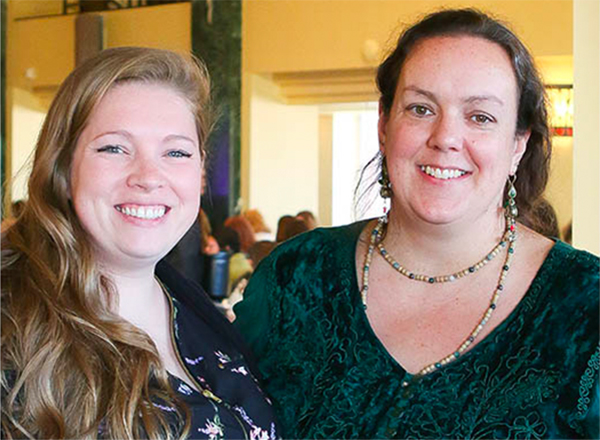First cohort will graduate from HFC Lactation Consultant program in May

Stephanie Arredondo, Clare Durina, Gitty Edri, and Lauren Fisher comprise the first graduating cohort of HFC’s Lactation Consultant Program, a partnership between the College and Ascension St. John Hospital in Detroit established in the Fall 2019 Semester.
“It’s exciting! The program is really well-designed. We perhaps have a bit of extra pressure on us to do well and represent the program, but we also got so much individual care and attention due to being such a small cohort,” said Durina, who graduated from Lakeview High School in St. Clair Shores and lives in Redford with her family.
Accredited through the Commission on Accreditation of Allied Health Education Programs (CAAHEP), the Lactation Consultant Program is a certification program that allows students to become International Board Certified Lactation Consultants (IBCLC), a healthcare profession specializing in the clinical management of breastfeeding.
First of its kind at HFC, only CAAHEP-accredited program in Michigan
HFC is the first academic Pathway 2 IBCLC training program in Michigan. It is the only CAAHEP-accredited program in Michigan. It is the only CAAHEP-accredited program offered to both undergraduate students and to non-nursing majors. It is one of only nine CAAHEP-accredited lactation programs in the entire world. CAAHEP-accredited programs provide classroom instruction and clinical experience, which qualify graduates for the IBCLC Examiners Pathway 2 certification exam.
This certification program is under the direction of Dr. Paula Schreck. Its faculty contact at HFC is Dr. Cynthia Scheuer.
“I was planning to become an IBCLC through a different pathway, which is a long and complicated and expensive process. HFC was my best option to do the required classes. When I did, this program came up. I enrolled and began, not really knowing that the program was brand new. I am so glad that I did!” said Durina.
Feeling empowered and supported
Durina confessed that she was initially intimidated by peers who had more clinical experience than she did and had worked in the healthcare field or a lactation center before. Her fears proved unfounded.
“Everyone involved in this program has been phenomenal to work with. I felt empowered and supported, and the other students, clinical instructors, and faculty became my teammates,” said Durina.
Although there was a lot of content to cover in a short time and the material was challenging, the immersive nature of the clinical days and weekly lectures made it possible for everyone to make rapid progress and understand the concepts – both practically and academically.
“In our careers as IBCLCs, we will be called upon to assess complex situations and make individual recommendations,” she said. “I feel like we were well-prepared to do that.”
Role model and change agent
Durina said Schreck's approach made a huge difference.
“Dr. Schreck is absolutely dynamic,” she said. “Every lecture has given us a close-up look at the facts of the topic, and – more importantly – the whys and hows. Women's health professionals typically attend a few conferences a year to hear content like this; it is often expensive to attend these events. Dr. Schreck travels around the country and presents these same topics to professional organizations. We are extremely lucky to get this opportunity every week!”
During clinicals, Schreck expected the students to think like lactation consultants, said Durina, who found the process invigorating.
“I felt challenged and empowered by the intensity of the environment, and never discouraged,” she said. “I see Dr. Schreck as a role model completely aside from her position and experience in the lactation or medical fields. She is a real change agent; she sees problems and she works to fix them. She takes risks. These qualities have made as much of an impact on me as her lectures and instruction.”
Clinical experience and didactic education complementary
Clinicals were the best part of this program for Durina.
“It is really life-changing to get those hours of clinical instruction,” she said. “Our fabulous clinical instructor, Blair Malian, and the lactation consultants at the hospitals are also a great part of the team, offering their own perspectives and styles. The whole program is coordinated so that our clinical experience and didactic education complement one another.”
For Durina, the most challenging aspect of the program was the time commitment. She’s a single mother of six kids who works full-time and attends school full-time. While it has been exhausting, she believes it was worth it.
“I have enjoyed and benefited from every class I have taken at HFC,” said Durina. “It is sometimes funny to be 20 years older than the rest of my class, but I have felt supported and encouraged by every professor. My daughter is now a student at HFC as well.”
Via Lactea
Durina’s ultimate goal is to start her own business and employ other lactation consultants. In fact, she just incorporated her business venture called Via Lactea in March.
“I have seen firsthand that many women have difficulty accessing lactation assistance when they need it, and too many feel unsupported in the workplace when they are pumping breast milk,” she said. “Via Lactea will provide lactation support services to businesses and their employees. That will include consultation and design services for company lactation policy and set-up of lactation rooms, in-house lactation education and consultations, and home visits with an IBCLC for employees and their spouses, all paid for by the employer.”
For more information on the Lactation Consulting program at HFC, call 313-845-9877.